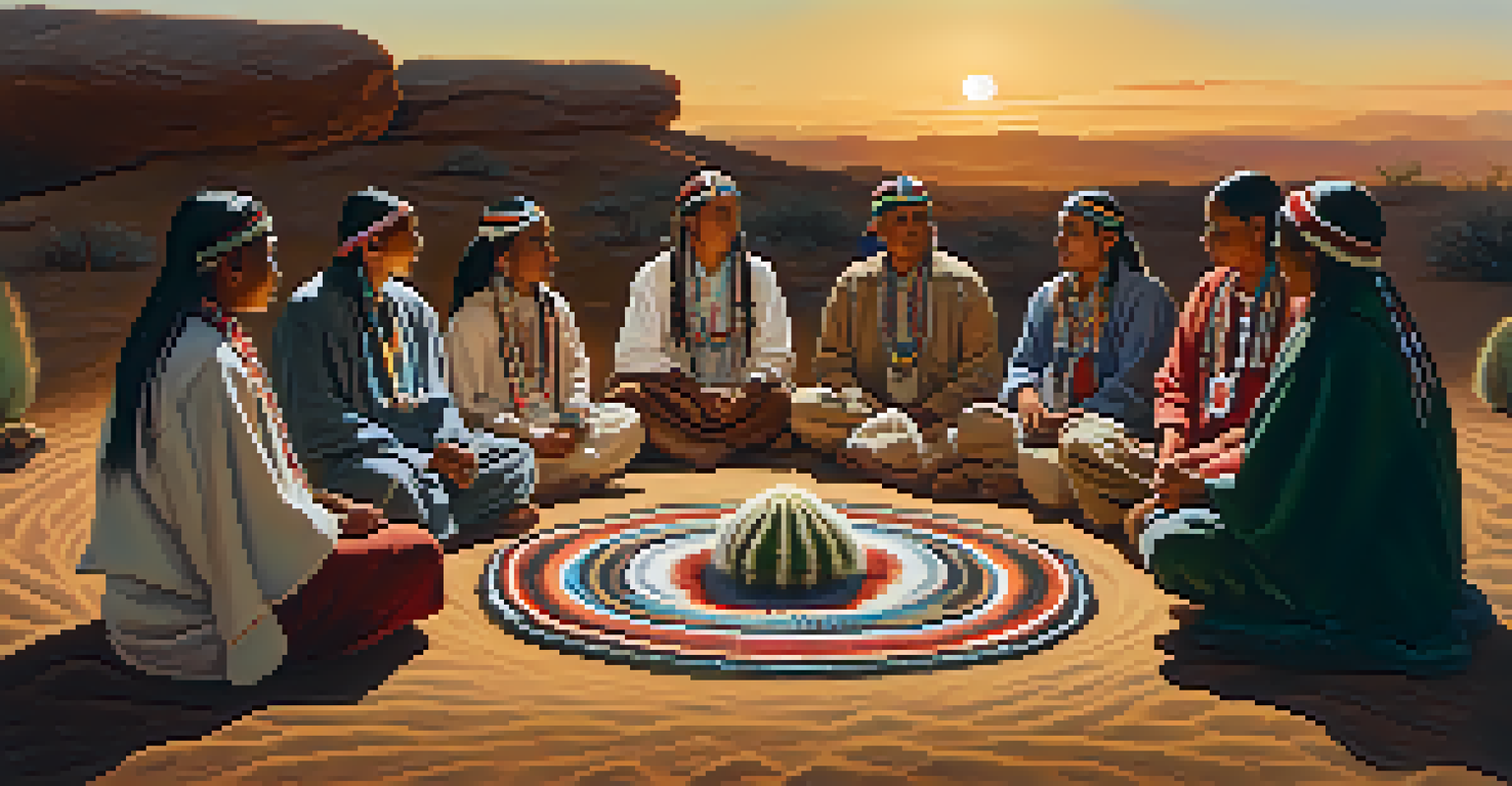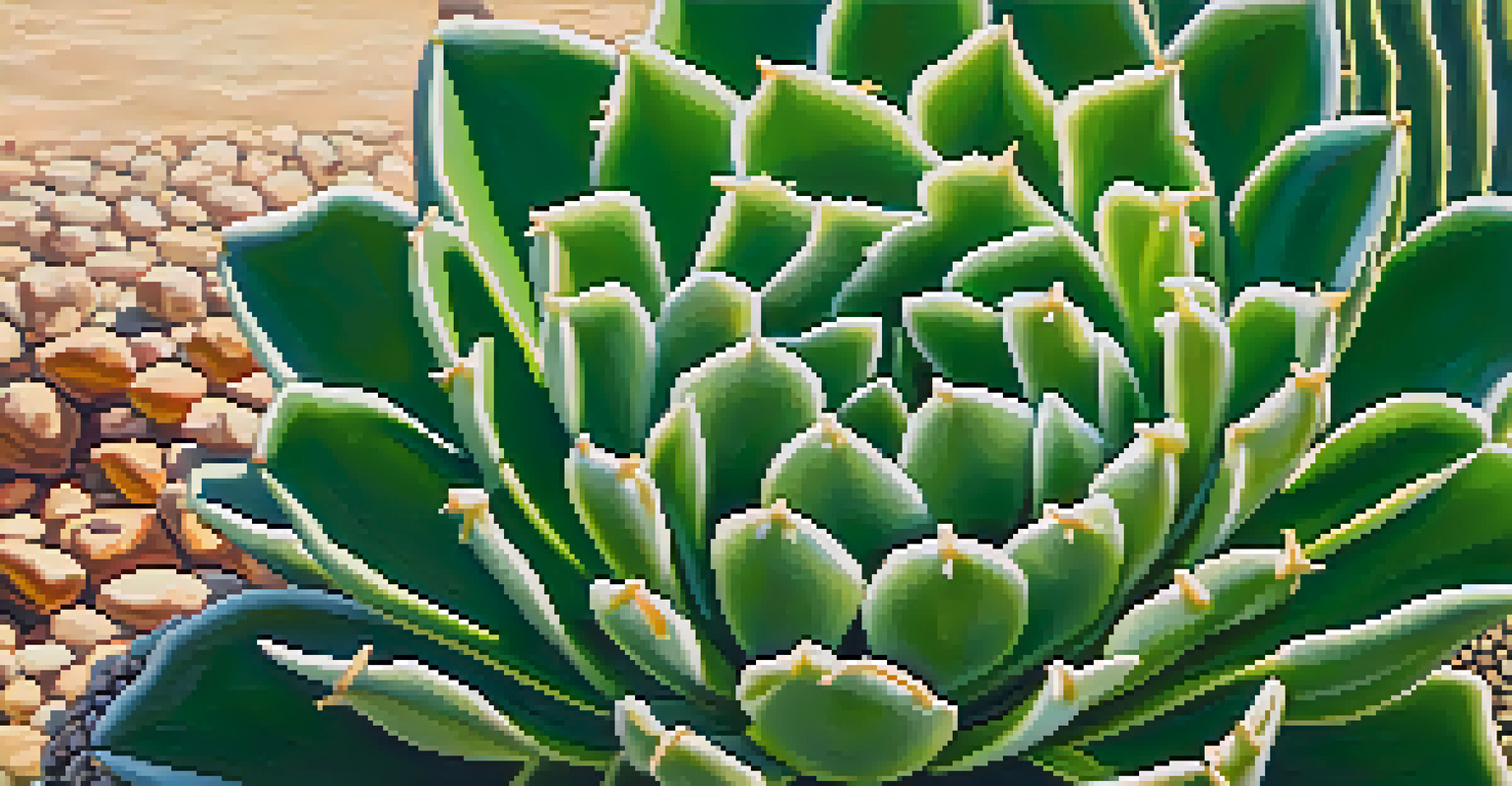The Spiritual Significance of Peyote in Indigenous Cultures

Understanding Peyote: A Sacred Cactus
Peyote, a small spineless cactus native to Mexico and the southwestern United States, holds profound spiritual significance for various Indigenous cultures. For these communities, peyote is not just a plant but a sacred medicine that is integral to their spiritual and cultural practices. Its psychoactive properties, primarily due to the compound mescaline, facilitate deep introspective journeys and communal experiences.
The cactus is a sacred plant that offers us the chance to connect with our ancestors and the universe.
The use of peyote dates back thousands of years, with archaeological evidence suggesting its consumption in ritualistic contexts. This sacred cactus is often associated with healing, connection to the divine, and the pursuit of knowledge. In many Indigenous traditions, peyote is considered a gift from the Creator, imbued with the power to foster spiritual growth.
As we delve into the spiritual significance of peyote, it is essential to recognize its role beyond mere intoxication. Instead, it serves as a bridge between the physical and spiritual realms, allowing individuals to experience profound insights and transformative journeys.
Cultural Context: Peyote in Indigenous Traditions
Different Indigenous groups, such as the Huichol, Navajo, and Lakota, incorporate peyote into their cultural and spiritual practices in unique ways. For example, the Huichol people regard the cactus as a central element of their cosmology, often embarking on pilgrimages to collect it from its natural habitat. This journey symbolizes a deep connection to their ancestors and the natural world.

In Navajo culture, peyote is used during healing ceremonies, where it is believed to help restore balance and harmony within individuals and communities. The ceremonial use involves prayers, songs, and rituals, emphasizing the importance of community and collective healing.
Peyote's Spiritual Importance
Peyote serves as a sacred medicine for Indigenous cultures, facilitating spiritual growth and communal healing.
Moreover, the peyote ceremony is a space where participants can share their personal stories, fostering a sense of connection and support. This communal aspect highlights how peyote serves not only as a spiritual tool but also as a catalyst for social bonding and cultural identity.
The Role of Peyote in Spiritual Healing
For many Indigenous cultures, peyote is revered for its healing properties, both physical and spiritual. The psychoactive effects of peyote can induce altered states of consciousness, allowing individuals to confront personal traumas and seek clarity in their lives. This process is often guided by a spiritual leader or shaman, who facilitates the ceremony and provides support.
In the journey of healing through peyote, we find not only ourselves but also the strength of our community.
Participants may experience visions or insights that are interpreted as messages from the spiritual realm. These revelations can lead to emotional healing, personal growth, and a deeper understanding of one’s purpose. The peyote experience is often described as a journey of self-discovery, where individuals confront their fears and celebrate their strengths.
Healing through peyote is not solely an individual experience; it is also communal. Sharing these journeys within a supportive group fosters an environment of empathy and understanding, reinforcing the bonds of community and collective resilience.
Peyote in Contemporary Indigenous Practices
Despite the challenges posed by modern society, many Indigenous communities continue to embrace peyote as a vital aspect of their cultural identity. In recent years, there has been a resurgence in interest surrounding traditional practices, including the use of peyote in ceremonies. This revival is seen as a way to reclaim cultural heritage and assert Indigenous sovereignty.
Organizations like the Native American Church advocate for the legal protection of peyote use in religious ceremonies, emphasizing its cultural importance. Legal battles continue in various regions, reflecting the ongoing struggle for Indigenous rights and recognition of spiritual practices.
Cultural Practices and Resilience
Indigenous communities continue to embrace peyote as a vital part of their cultural identity, despite facing modern challenges.
As contemporary Indigenous peoples navigate modernity, peyote remains a symbol of resilience and continuity. Its enduring significance serves as a reminder of the rich spiritual traditions that are deeply intertwined with cultural identity and community well-being.
Peyote and Environmental Stewardship
The cultivation and harvesting of peyote also raise important questions about environmental stewardship among Indigenous communities. As demand for peyote increases, so does the need for sustainable practices to ensure the cactus’s survival in its natural habitat. Indigenous peoples often emphasize the importance of protecting the land and ecosystems that support peyote growth.
Many Indigenous traditions advocate for a deep respect for nature, viewing the land as sacred. This philosophy extends to the harvesting of peyote, where careful consideration is given to the ecological impact. Sustainable harvesting practices help maintain the balance between spiritual use and environmental conservation.
Furthermore, the relationship between peyote and its environment serves as a microcosm for broader discussions on climate change and land rights. By advocating for the preservation of peyote habitats, Indigenous communities are also championing the health of the planet and asserting their role as stewards of the land.
Challenges Facing Peyote Use Today
Despite its cultural significance, the use of peyote faces numerous challenges today. Overharvesting, habitat destruction, and legal restrictions threaten the availability of this sacred cactus. As Indigenous communities continue to advocate for their rights to use peyote, they also face the pressure of modernization and changing societal norms.
Additionally, the increasing commercialization of peyote raises ethical concerns. The commodification of sacred plants can lead to a disconnect from their spiritual significance and cultural roots. It is crucial for non-Indigenous individuals to approach peyote with respect and understanding, recognizing its profound importance to Indigenous peoples.
Environmental Stewardship Needed
Sustainable practices are crucial for the cultivation of peyote, ensuring its survival and the health of ecosystems.
These challenges underscore the need for ongoing dialogue and collaboration between Indigenous communities and broader society. By fostering understanding and respect for the significance of peyote, we can work towards preserving this vital cultural heritage.
The Future of Peyote in Indigenous Spirituality
Looking ahead, the future of peyote in Indigenous spirituality hinges on a delicate balance between tradition and modernity. As younger generations seek to understand their cultural heritage, there is a growing interest in peyote and its spiritual teachings. This revival is encouraging a renewed focus on traditional practices and the teachings of elders.
The integration of modern practices, such as community education and advocacy, is also vital for the survival of peyote traditions. By engaging in discussions about the spiritual, cultural, and environmental aspects of peyote use, Indigenous communities can ensure that their heritage is preserved for future generations.

Ultimately, the future of peyote is intertwined with the resilience of Indigenous cultures. As they navigate the complexities of contemporary life, the spiritual significance of peyote remains a powerful symbol of identity, healing, and connection to the earth.